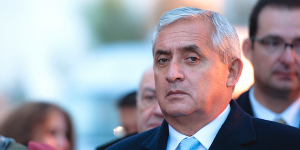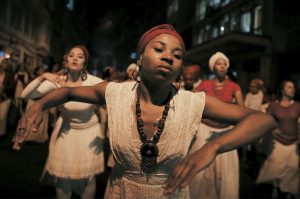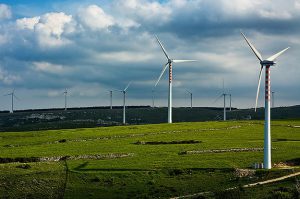
Central American Refugees Turn South as U.S. and Mexico Tighten Borders
In July 2014, at the peak of the Central American migration crisis in the U.S., officials in Mexico announced a plan to stem the tide of illegal entries on the country’s porous southern border with Guatemala. Dubbed Programa Frontera Sur, the new policy was partly responsible for a dramatic drop in the number of unaccompanied minors arriving … Read more

This Week in Latin America: Political Crises in Guatemala
Here are a few of the stories we’re following this week: Turmoil in Guatemala: Guatemala’s President Otto Pérez Molina (pictured) may face impeachment over his alleged participation in a wide-ranging corruption scandal involving the country’s customs agency. The president denied any connection with the scheme during a televised address on Sunday night, just days after his former vice-president, Roxana Baldetti, was arrested on fraud charges. The scandal … Read more
Endnotes: Race and Ethnicity in Latin America
Below are the endnotes from Race and Ethnicity in Latin America by Judith A. Morrison (Summer 2015 AQ). The views expressed in this article are the author’s own and do not necessarily reflect those of the institution with which she is affiliated. Molinas Vega, Jose R.; Barros, Ricardo Paes de; Saavedra Chanduvi, Jaime; Giugale, Marcelo; Cord, Louise … Read more
Endnotes: The Informal Sector and Social Marginality Are Expanding in Latin America
Below are the endnotes from Hard Talk: The Informal Sector and Social Marginality Are Expanding in Latin America by William I. Robinson (Summer 2015 AQ). The first country to reform its labor laws was Chile, in 1978 and 1979, followed by Colombia in 1990, Peru in 1991, Argentina in 1991 and 1995, Panama in 1990, again in … Read more

Behind the Numbers: Race and Ethnicity in Latin America
Throughout Latin America, race and ethnicity continue to be among the most important determinants of access to opportunity and economic advancement. Indigenous and Afro-descendant peoples in Latin America represent 40 percent of the total population—a sizeable share—yet they remain a disproportionate segment of the poorest of the poor. While a priority for social inclusion measures, … Read more

Getting to Win-Win: FTAs in the Americas
Over the past several decades, many of the hemisphere’s trade agreements have included impressively robust provisions on labor and the environment, but gaps in both implementation and enforcement have raised concerns about their effectiveness. Those concerns are especially timely as the region’s economic policymakers begin discussing efforts to facilitate greater international trade and investment, such … Read more
Ask the Experts: Trade is Back!
Antoni Estevadeordal answers: The June 2015 summit of the Community of Latin American and Caribbean States (CELAC) and the European Union (EU) made clear that countries on both sides of the Atlantic are thinking of ways to revamp their increasingly stagnant political and economic ties. While Latin American and Caribbean (LAC) exports to the EU … Read more
Leaks Bring New Information about Surveillance in Latin America to Light
Brazilian President Dilma Rousseff recently concluded her first state visit to the U.S. after abruptly canceling a trip scheduled for October 2013 due to allegations that the NSA had spied on her. While in the U.S., President Rousseff responded to questions about the spying issue, saying, “Some things have changed […] I believe President Obama.” … Read more
How Guns N’ Roses brought down Manuel Noriega
It was thanks in part to rock and roll hits from bands such as The Doors and Guns N’ Roses that Manuel Noriega, the former military dictator of Panama, fell from grace. In December 1989, with Noriega holed up at the Vatican embassy in Panama, the U.S. military installed a line of stereo speakers around the building blaring songs such as “Dead … Read more

Paraguay’s Surprisingly Powerful Voice in Climate Negotiations
When Paraguay joined ranks with a group of fellow Latin American countries at the United Nations climate talks this month, the media scarcely noticed. After all, its coverage of the UN’s ongoing negotiations to deal with global warming tend to focus on more “dramatic” developments—spats between major powers and the glacial pace of negotiations. It’s … Read more
Monday Memo: Mexican Same-Sex Marriage—Haitian Deportation—U.S. and Venezuela Meeting—Nicaraguan Protest—ELN Leader Death
This week’s likely news stories: Dominican Republic set to deport individuals of Haitian descent; Mexican high court paves way for full marriage equality; U.S. and Venezuelan officials meet in Haiti, address strained relations; Nicaraguans protest Chinese-funded canal project; top ELN commander killed in Colombia Dominican Republic to Deport Dominicans of Haitian Descent: The Dominican Republic … Read more
Veteran Judge Sworn in as Guatemala’s New Vice President
Judge Alejandro Maldonado Aguirre was sworn in as Guatemala’s new vice president on May 15 after his predecessor, Roxana Baldetti, was forced to step down in the wake of a major corruption scandal. Maldonado Aguirre was not originally included in the shortlist of candidates that President Otto Pérez Molina sent to Congress. The original list … Read more
The Next Chapter for China in the Americas
Chinese Premier Li Keqiang begins an eight day trip to South America today, landing in Brazil with a promise of some $50 billion in Chinese investments in Brazilian infrastructure. This trip follows on and is consistent with the promise that President Xi Jinping made in January to invest $250 billion in Latin America and the Caribbean … Read more
Former Colombian President Álvaro Uribe Responds to Sentencing of Top Aides
Former Colombian President Álvaro Uribe responded yesterday to the Colombian Supreme Court’s April 30 sentencing of two high-ranking members of his administration who organized a spy ring targeting Uribe’s political opponents and critics. María del Pilar Hurtado, former head of the now-defunct Colombian intelligence agency Departamento Administrativo de Seguridad (DAS), received a 14-year prison term, … Read more
Monday Memo: U.S. Delegation in Cuba—Venezuela Loan—Caribbean Fiber Optic Cable—Activist Murders in Honduras—Argentina-Falklands Oil
This week’s likely top stories: U.S. trade delegation arrives in Cuba; Venezuela receives a $5 billion Chinese loan; Caribbean’s longest fiber optic cable nearly complete; NGO says Honduras leads the world in per capita murders of environmental activists; Argentina sues five companies over Falklands oil exploration. Governor Cuomo and U.S. Companies Visit Cuba: New York … Read more


